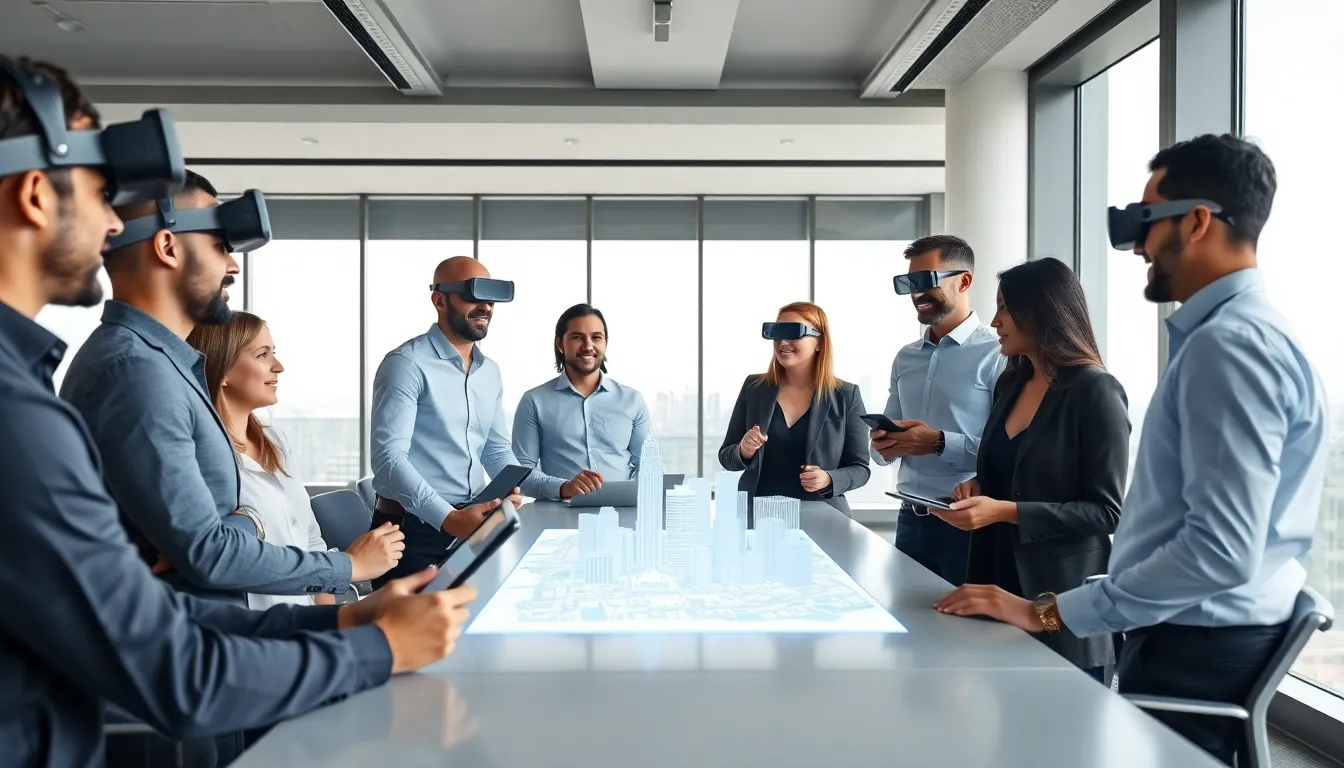Table of Contents
ToggleEver wondered how a digital dragon can roam your living room or how your new shoes look on you before you even click ‘buy’? Welcome to the world of augmented reality (AR), the technology that blends the virtual and real worlds seamlessly. In a landscape dominated by tech innovations, augmented reality experts are the architects crafting these immersive experiences. Let’s jump into the realm of AR and uncover how these trailblazers are revolutionizing our interaction with the digital space.
Understanding Augmented Reality

To appreciate the ingenuity of augmented reality, one must first grasp what it truly is. AR overlays digital information in the real world, allowing us to see things that aren’t physically present. Think of Pokémon GO, where trainers pursue virtual creatures in real parks or the interactive features in IKEA’s app that let users visualize furniture in their own homes. Essentially, augmented reality enriches our perception without entirely replacing the reality we live in. This blending creates countless opportunities, from training simulations in medicine to enhancing consumer engagement in retail, truly reshaping how we interact with our environment.
Key Skills and Expertise Required
Becoming an augmented reality expert isn’t just about dabbling in the latest tech toys: it requires a distinctive set of skills. A solid foundation in computer science forms the backbone of AR expertise. This includes proficiency in programming languages like C# and Java, which empower developers to create interactive and responsive experiences. Also, a keen understanding of 3D modeling software, such as Blender or Maya, is crucial. Experts also need to be well-versed in user experience (UX) design to ensure that products are intuitive and engaging for users. Besides, knowledge of hardware such as AR glasses or smartphones enhances an expert’s ability to harness technology effectively. Coding, design, and hardware integration, the perfect trio for an AR career.
Notable Experts in Augmented Reality
Several figures have emerged as frontrunners in the augmented reality landscape, forging paths that many aspire to follow. One standout is Tony Parisi, a pioneer in the field, who co-created the original Virtual Reality Modeling Language (VRML) and is now shaping the AR narrative at Unity Technologies. Similarly, Ori Inbar is another influential voice, recognized for his role in education about augmented reality through the AR Insider network. These experts have not only contributed to technological advancements but also fostered community growth, often through education and advocacy. They offer insights that continue to inspire the next generation of AR innovators.
Impact of Augmented Reality in Various Industries
The influence of augmented reality extends far beyond gaming: it’s a transformative tool across many sectors. In healthcare, AR aids surgeons by overlaying critical data during operations, improving precision and outcomes. The retail industry has seen AR fuel immersive shopping experiences, where customers can visualize products in their personal spaces before purchasing. Education, too, benefits as AR-enabled resources enhance learning by positioning interactive elements atop textbooks or real-world scenarios. Even real estate firms leverage AR to allow potential buyers to take virtual tours of properties. Across diverse industries, augmented reality is bridging the gap between information and experience.
Future Trends and Predictions in Augmented Reality
As technology continues to advance, the future of augmented reality looks nothing short of promising. Predictions suggest a significant rise in AR adoption in everyday applications. Brands are likely to integrate AR into shopping experiences more deeply, personalizing customer interactions like never before. Also, the development of more sophisticated AR hardware, such as lighter, smarter glasses, is on the horizon, potentially making AR experiences more accessible. Experts believe the advent of 5G technology will enhance AR by providing faster data transmission, so enabling seamless, high-quality experiences. With a wave of innovation approaching, AR is set to elevate our engagement with both digital and physical realities.
How to Become an Augmented Reality Expert
If one aspires to become an augmented reality expert, the journey starts with education and curiosity. A degree in computer science, graphics design, or a related field is often the first step. But, theoretical knowledge alone won’t cut it. Practical experience is vital: creating personal AR projects can provide hands-on learning opportunities. Also, engaging with AR communities, attending workshops, and leveraging online resources are excellent ways to stay ahead of industry trends and technologies. Networking with established experts can also offer invaluable guidance and mentorship. Eventually, passion fuels proficiency in this evolving field.




